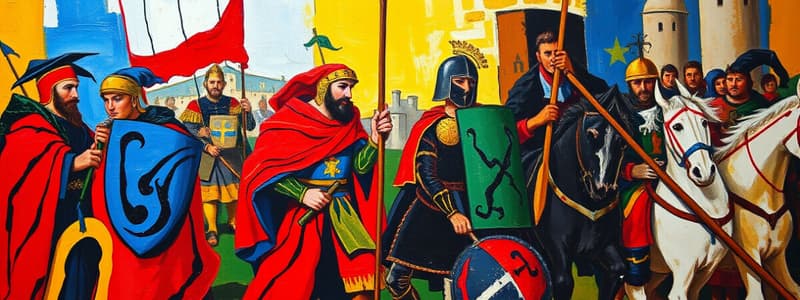Podcast
Questions and Answers
What was the primary economic system during medieval times based on land ownership and obligations between lords and vassals?
What was the primary economic system during medieval times based on land ownership and obligations between lords and vassals?
- Capitalism
- Feudalism (correct)
- Communism
- Socialism
The Catholic Church had minimal influence on medieval life.
The Catholic Church had minimal influence on medieval life.
False (B)
Islam was founded in the 7th century by the Prophet __________.
Islam was founded in the 7th century by the Prophet __________.
Muhammad
What major event did the Black Death take place in Europe?
What major event did the Black Death take place in Europe?
Which of the following was NOT one of the Five Pillars of Islam?
Which of the following was NOT one of the Five Pillars of Islam?
The Hijra marks the migration of Muhammad from Mecca to Medina.
The Hijra marks the migration of Muhammad from Mecca to Medina.
Name one key period of Islamic rule that emphasized culture, science, and trade.
Name one key period of Islamic rule that emphasized culture, science, and trade.
During the Crusades, Christian states aimed to reclaim the __________ from Muslim control.
During the Crusades, Christian states aimed to reclaim the __________ from Muslim control.
Match the historical events or concepts with their descriptions:
Match the historical events or concepts with their descriptions:
Which caliphate focused on military expansion in the early Islamic period?
Which caliphate focused on military expansion in the early Islamic period?
Flashcards are hidden until you start studying
Study Notes
Medieval History
- Time Period: Roughly 5th to late 15th century, marking the fall of the Roman Empire to the beginning of the Renaissance.
- Key Features:
- Feudalism: A social and economic system based on land ownership and obligations between lords and vassals.
- Manorialism: Economic structure where peasants worked land for lords in exchange for protection and a place to live.
- Church Influence: The Catholic Church was the dominant religious institution, influencing all aspects of medieval life.
- Crusades (1096-1291): Religious wars initiated by the Christian states to reclaim the Holy Land from Muslim control.
- Black Death (1347-1351): A devastating plague that killed a significant portion of Europe’s population, leading to major social and economic changes.
- Rise of Towns and Trade: Growth of merchant class and the establishment of trade routes, leading to the decline of feudalism.
Rise and Spread of Islam
- Founding: Islam was founded in the 7th century CE by the Prophet Muhammad in Mecca, present-day Saudi Arabia.
- Core Beliefs: Five Pillars of Islam include Shahada (faith), Salah (prayer), Zakat (charity), Sawm (fasting during Ramadan), and Hajj (pilgrimage to Mecca).
- Major Events:
- Hijra (622 CE): Muhammad’s migration from Mecca to Medina, marking the beginning of the Islamic calendar.
- Conquests (7th-8th centuries): Rapid expansion through military conquests and trade, establishing caliphates across the Middle East, North Africa, and into Spain and India.
- Umayyad and Abbasid Caliphates: Key periods of Islamic rule; the Umayyads focused on expansion, while the Abbasids emphasized culture, science, and trade.
- Cultural Impact:
- Spread of Arabic language and culture.
- Contributions to science, mathematics, medicine, and philosophy during the Golden Age of Islam (8th-14th centuries).
- Diversity: Emergence of various sects, primarily Sunni and Shia, with distinct beliefs and practices.
Medieval History
- Time period spans from the 5th to late 15th century, encompassing the fall of the Roman Empire and the beginning of the Renaissance.
- Feudalism served as the primary social and economic system, organized around land ownership and the relationships between lords and vassals.
- Manorialism was the economic framework where peasants worked the land owned by lords in exchange for protection and shelter.
- The Catholic Church dominated religious life, influencing social norms, education, and political matters throughout the medieval period.
- The Crusades, occurring from 1096 to 1291, were a series of religious military campaigns aimed at reclaiming the Holy Land from Muslim control.
- The Black Death, which ravaged Europe between 1347 and 1351, resulted in the death of a large portion of the population, dramatically altering social and economic structures.
- The rise of towns and trade led to the growth of a merchant class and the establishment of trade routes, contributing to the decline of feudalism.
Rise and Spread of Islam
- Founded in the 7th century CE by the Prophet Muhammad in Mecca, now part of Saudi Arabia.
- The core beliefs of Islam are encapsulated in the Five Pillars: Shahada (declaration of faith), Salah (prayer), Zakat (charity), Sawm (fasting during Ramadan), and Hajj (pilgrimage to Mecca).
- The Hijra in 622 CE marked Muhammad's migration from Mecca to Medina, which initiated the Islamic calendar.
- Rapid expansion of Islam occurred through military conquests and trade during the 7th and 8th centuries, resulting in the establishment of caliphates in the Middle East, North Africa, Spain, and India.
- The Umayyad Caliphate focused on territorial expansion, while the Abbasid Caliphate prioritized cultural, scientific, and trade advancements.
- The spread of the Arabic language and culture was significant during this era, alongside major contributions to science, mathematics, medicine, and philosophy during the Islamic Golden Age, lasting from the 8th to 14th centuries.
- Islamic diversity emerged with various sects, mainly Sunni and Shia, each with distinct beliefs and practices.
Studying That Suits You
Use AI to generate personalized quizzes and flashcards to suit your learning preferences.




